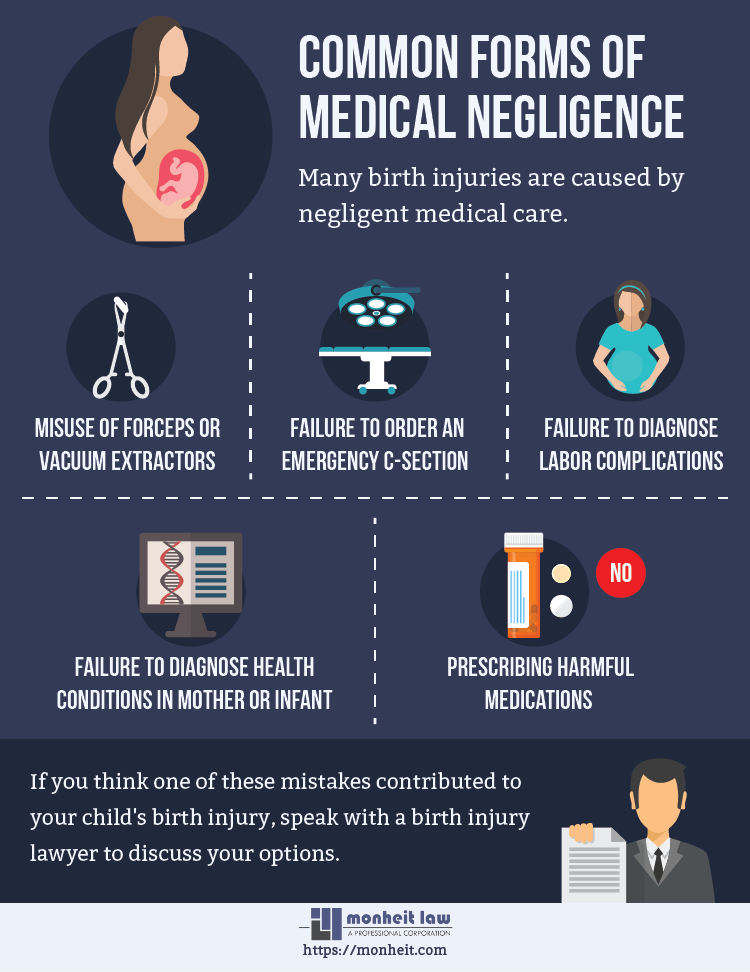Do you suspect medical malpractice is to blame for your child's birth injury? You may be asking such questions as:
- How is malpractice defined?
- What's the difference between negligence and malpractice?
- What type of compensation could I recover in a lawsuit?
Our experienced medical malpractice attorneys are here to help your family.

You don't have to go through this alone. When medical negligence causes an injury, our lawyers are prepared to fight for financial compensation for families.
Many birth injuries are due to simply unavoidable circumstances. However, many others are preventable and the result of medical negligence.
Each year, about 28,000 infants are delivered with a birth injury. It's always tragic to see a child be forced to struggle with extra burdens from the very beginning of life.
If you're a parent of one of these children, you may have some questions. Could anything have been done to prevent your child's injuries? And if so, who is responsible for the mistakes which lead to the injury?
At Monheit Law, our seasoned injury attorneys have many years of experience representing the families of birth injury victims. We're prepared to help you answer these questions and to help your family during this difficult time.
Defining Medical Negligence
In order to pursue a medical malpractice case in Pennsylvania, medical negligence must be proved first. Legally speaking, a healthcare professional is required to meet the legal standard of care - a term which refers to the widely accepted medical practices of the healthcare professional's peers.
If it is determined that a healthcare professional acted in a way which violated this standard, he or she may be labeled negligent in birth injury cases.
Obstetricians and midwives directly involved in the delivery are not the only ones who may be found negligent. Nurses, anesthesiologists, drug companies, and the hospital itself may be deemed negligent for their role in a birth injury.
FREE CONSULTATION
Examples Of Medical Negligence
There are many forms of medical negligence in birth injury cases. Negligent actions and omissions may be the result of an incompetent medical professional. In other cases, hectic circumstances in the hospital could have caused an otherwise competent professional to make a costly mistake. Common examples of birth injury negligence include:
- Failure to monitor, diagnose, and/or treat health problems in infant or mother
- Failure to order a medically necessary c-section
- Delayed c-sections
- Prescribing harmful medications
- Improper use of delivery tools such as vacuum extractors and forceps
- Failure to diagnose and/or treat labor complications
Do you suspect that one of these forms of negligence played a role in your child's injuries? If so, it's best to contact a medical malpractice attorney with experience evaluating and trying birth injury cases. At Monheit Law, our birth injury lawyers have experience working with seasoned medical professionals to uncover medical negligence and malpractice and hold negligent parties liable for damages.
When Does Negligence Become Malpractice?
Not all cases of medical negligence qualify for a medical malpractice lawsuit. According to Pennsylvania law, the plaintiff must prove 4 things before being permitted to sue for medical malpractice:
- Doctor-patient relationship - There must be an official documented doctor-patient relationship, in which the defendant owed the plaintiff a duty of care.
- Negligent doctor - The doctor violated the standard of care by either a negligent action or negligent omission.
- Negligence caused the injury - A birth injury was the direct result of this negligent action or omission.
- The injury caused damages - The family has faced economic and/or emotional difficulties as a result of the birth injury.
Each birth injury case is a unique combination of many variables. Experienced birth injury law firms work in concert with experienced medical professionals in order to analyze the details of a possible lawsuit. The medical professionals can help to define the local standards of care and determine if a violation of these standards lead to a birth injury and subsequent damages.

What Does A Successful Medical Malpractice Lawsuit Look Like?
Let's take a look at a recent medical malpractice case involving a birth injury.
Welker v. Carnevale et al
In January of 2017, a federal jury in Western PA awarded nearly $14.5 million in damages in a medical malpractice birth injury lawsuit.
Details of the Incident
In July of 2012, plaintiff Nicole Welker was admitted to the labor unit of Clearfield hospital in western Pennsylvania, accompanied by her partner Justin Brinkley. Defendant Dr. Thomas Carnevale was in charge of overseeing the labor process and facilitating the delivery.
According to a pretrial memo, the doctor monitored Welker's contractions and dilations. Despite the fact that they were progressing, he decided to administer a uterine stimulant called Pitocin. This drug is used to accelerate contractions, which suggests that Dr. Carnevale failed to realize that the dilations and contractions were already progressing.
According to this memo, Dr. Carnevale administered an exceedingly high dose of Pitocin. The fetal heart rate began to drop over the course of the next hour, at which point Carnevale decided to expedite the delivery. At this point, Welker should have been taken off Pitocin, but instead, she remained on the drug throughout the delivery.
About ten minutes into the delivery, the baby's head began to crown. At this point, a vacuum extractor or forceps could have been used to complete the delivery - but they weren't. Instead, the delivery continued for ten additional minutes until it was eventually completed via episiotomy. The infant suffered from several birth injuries, including spastic tetraparesis cerebral palsy, cognitive impairments, seizures, and global aphasia.
Civil Trial & Verdict
The plaintiffs sued Dr. Carnevale and Clearfield Hospital for medical malpractice, arguing that Carnevale's negligence directly caused their son's permanent brain damage, cerebral palsy, and related ailments. In the final verdict, the federal jury ruled in favor of the plaintiff and assigned 60% liability to Dr. Carnevale and 40% liability to the hospital.
Supplementary Info
Monheit Law Montgomery County Office 215-866-2018
Directions to our Montgomery County Injury Law Office
4V4Q+FM Jenkintown, Pennsylvania
Open 24 hours
Negligence & malpractice attorney Jenkintown
Civil law attorney
Employment attorney
Law firm
Attorney
Social security attorney
Monheit Law South Philly Office 215-302-0095
Directions to our South Philly Injury Law Office
WRCH+CP Philadelphia, Pennsylvania
Open 24 hours
Negligence & malpractice attorney South Philly
Civil law attorney
Employment attorney
Law firm
Attorney
Social security attorney
